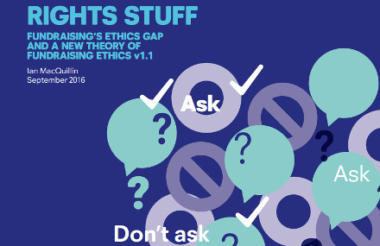Academic theory on fundraising ethics has ignored beneficiaries and focused too much on donors, according to the latest Rogare white paper.
Rogare, the fundraising think tank based at Plymouth University, today published a white paper Rights Stuff: Fundraising’s ethics gaps and a new theory of fundraising ethics, which argues that fundraisers have a duty to both beneficiaries and donors.
It has called the new theory ‘Rights Balancing Fundraising Ethics’, and states: “Fundraising is ethical when it balances the duty of fundraisers to solicit support on behalf of their beneficiaries, with the right of donors not to be subjected to undue pressure to donate.”
'Little theory development'
Ian MacQuillin, director at Rogare and author of the paper said: “For such a fundamentally important topic, there has been surprisingly little theory development of fundraising ethics over the past 25 years.
“Fundraisers have a lot of applied ethics contained in their codes of practice, which tells them what they may or may not do. But there is very little in the way of ‘normative’ ethics that helps fundraisers understand why they ought or ought not do particular things, or provides a context for their ethical decision making frameworks.”
Other theories of normative ethics outlined in the paper include ‘trustism’, focusing on public trust and ‘donorcentricism’, prioritising the needs of the donor.
MacQuillin said: “What normative thinking there has been quite startlingly ignores beneficiaries and focuses almost exclusively on fundraisers’ duties to their donors. Surprising as it may seem, Rights Balancing Fundraising Ethics brings beneficiaries into ethical decision making in fundraising for the first time.”
Rogare now plans to carry out a global survey of the existing ethical decision making processes used by fundraisers and launch a project looking at how beneficiaries are represented in marketing materials.









